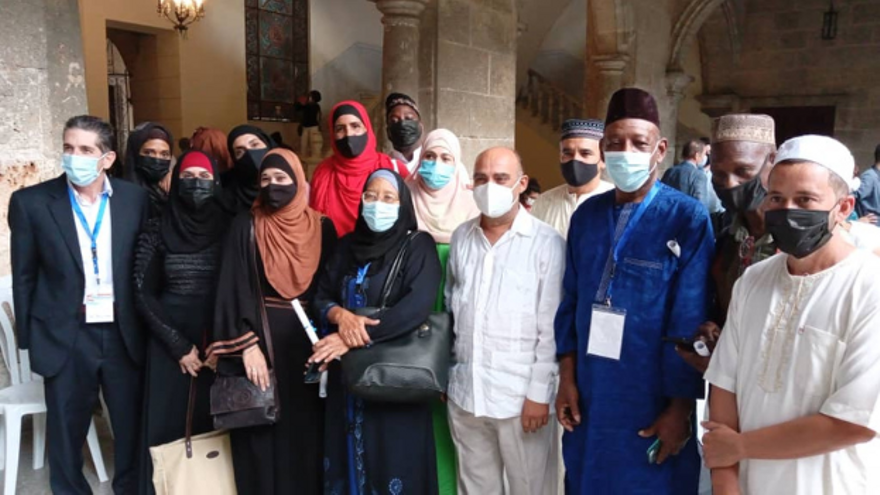
![]() 14ymedio, Havana, 2 August 2022 — On Thursday, Prisoners Defenders shared their report, Constitutional Reform and Religious Freedom in Cuba, a companion document to accompany the evaluation conducted by the U.S. Commission on International Religious Freedom (USCIRF).
14ymedio, Havana, 2 August 2022 — On Thursday, Prisoners Defenders shared their report, Constitutional Reform and Religious Freedom in Cuba, a companion document to accompany the evaluation conducted by the U.S. Commission on International Religious Freedom (USCIRF).
In this new document, Prisoners Defenders, which contributed to the U.S. report, analyzed the testimonies of 56 religious leaders and lay Cubans from the four major religions in the country: Catholics, Protestants, Yorubas and Muslims.
The document highlights the complete or partial violations of rights associated with the optimal exercise of religious freedom, by government authorities, police and the Office of Religious and Communist Party Affairs, in particular. These include the right to freedom of expression, assembly, association, privacy/intimacy, non-discrimination and movement.
Some “considerations on the Constitution” detail legal issues related to religious freedom in the Cuban Constitution of 2019. To this end, Prisoners Defenders conducted an analysis this year, which concluded that “compared to the Constitution of 1976, the current Constitution represents a slight backsliding related to normalization of the legal framework on religious matters.”
Publishing of the new Constitution eliminated the possibility of drafting a Religions Law, a “pending task” since 1976. Furthermore, in proclaiming that “the Communist Party” is the superior political force leading society and the State,” the constitutional text limits its own field of action and confers upon the Party a “supra-constitutional” status.
According to the report, the Party as well as its Office of Religious Affairs are “dark organizations and work in the absence of legislation.”
One extensive section on repression provides specific data on the frequency with which religious leaders receive police summons, prohibitions of any kind, arbitrary detentions, acts of repudiation, surveillance, and expressions of hate. Several cases also refer to the inability to conduct processions, public rituals, burials and visits as well as obstructing travel, donations and constructive works.
Prisoners Defenders describes the process through which the Cuban government has historically attempted to create “false institutions” which supplant the international representativeness of religious associations.
“In the case of Christian Churches it created the Council of Churches; in the Yoruba religion, the Yoruba Cultural Association; and in the Islamic religion, it created the Islamic League of Cuba. All three organizations are controlled by State Security,” the document states.
It also states that, although the “techniques” vary from one statement to the other, they share the same pattern of repression. However, the government “protects itself” against frontal attacks, especially toward the Catholic Church, due to the “organization and international protection said church has.”
With regard to Protestant churches, the repression “takes a more obvious form” in two phases. The objective of the first is to de-link a pastor’s activism from his superior leader, often at the international level, by means of blackmail. The second phase includes social isolation of the pastor, which typically ends in jail or exile.
With regard to the Yoruba religion, the report states that it is “pampered” by the government, however it is “illegal and has never been allowed or officially legitimized.” This drives the priest or babalawo to practice his religion “behind the law’s back, under unlawful conditions, perfect for blackmail at any moment.”
Repression of Islam is “a special case” according to Prisoners Defenders, as the government “created a registered institution with fake Muslims — State Security agents loyal to government officials,” as a maneuver to overshadow the work and prestige of Imam Hassan Abdul Gafur (Ernesto Silveira Cabrera), a driving force of the Muslim religion on the Island. Authorities systematically and internationally announced that Silveira was the creator of the official Islamic League, which contributed to the organization’s prestige.
The League provides added value, as it allows the Cuban government to claim, at an international level, that it is a “country that respects Islam”, which bought it favor in dealings with Muslim nations. All of the Islamic leaders interviewed were in agreement that the League has “an official political agenda” and that it is one of the religious arms of State Security.
In its report, Prisoners Defenders includes USCIRF’s conclusions regarding the limitations of religious organizations to perform charity, relying on communications media spaces and carrying out constructive reforms.
Furthermore, the report reiterates the considerations of the United Nations’ Special Rapporteur on Freedom of Religion or Belief on religious freedom on the Island. “The evaluation team determined that Cuba does not comply with 33 [indicators] and partially complied with three indicators,” indispensable for the free exercise of this right.
Translated by: Silvia Suárez
____________
COLLABORATE WITH OUR WORK: The 14ymedio team is committed to practicing serious journalism that reflects Cuba’s reality in all its depth. Thank you for joining us on this long journey. We invite you to continue supporting us by becoming a member of 14ymedio now. Together we can continue transforming journalism in Cuba.
